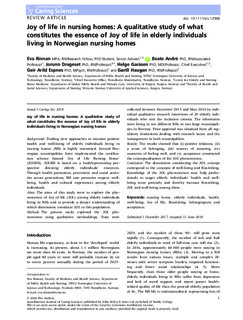Joy of life in nursing homes: A qualitative study of what constitutes the essence of joy of life in elderly individuals living in Norwegian nursing homes
Journal article, Peer reviewed
Published version
Permanent lenke
http://hdl.handle.net/11250/2566697Utgivelsesdato
2018Metadata
Vis full innførselSamlinger
Sammendrag
Background: Finding new approaches to increase positive health and well-being of elderly individuals living in nursing homes (NH) is highly warranted. Several Norwegian municipalities have implemented the certification scheme framed ‘Joy of Life Nursing Home’ (JOLNH). JOLNH is based on a health-promoting perspective directing elderly individuals’ resources. Through health promotion, preventive and social activities across generations, NH care promotes respect, wellbeing, health and cultural experiences among elderly individuals. Aims: The aims of this study were to explore the phenomenon of Joy of life (JOL) among elderly individuals living in NHs and to provide a deeper understanding of which dimensions constitute JOL in this population. Methods: The present study explored the JOL phenomenon using qualitative methodology. Data were collected between December 2015 and May 2016 by individual qualitative research interviews of 29 elderly individuals who met the inclusion criteria. The informants were living in ten different NHs in two large municipalities in Norway. Prior approval was obtained from all regulatory institutions dealing with research issues and the management in both municipalities. Results: The results showed that (i) positive relations, (ii) a sense of belonging, (iii) sources of meaning, (iv) moments of feeling well, and (v) acceptance constituted the conceptualisation of the JOL phenomenon. Conclusion: The dimensions constituting the JOL concept correspond to the concepts of well-being and flourishing. Knowledge of the JOL phenomenon may help professionals to target elderly individuals’ health and wellbeing more precisely and thereby increase flourishing, JOL and well-being among them.

